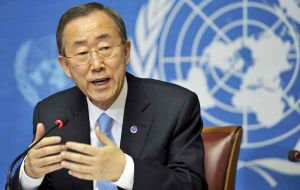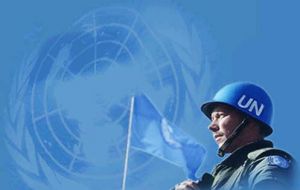MercoPress. South Atlantic News Agency
Ban Ki-moon stresses “invaluable contribution” of UN peacekeepers on their Day
 “Throughout its history, the UN has established a total of 71 peacekeeping operations” with more than one million personnel involved said Ban Ki-moon
“Throughout its history, the UN has established a total of 71 peacekeeping operations” with more than one million personnel involved said Ban Ki-moon  Through years of struggle and sacrifice, the iconic Blue Helmet has earned its place as a symbol of hope to millions of people living in war-ravaged lands.
Through years of struggle and sacrifice, the iconic Blue Helmet has earned its place as a symbol of hope to millions of people living in war-ravaged lands. On the International Day of United Nations Peacekeepers, Secretary-General Ban Ki-moon stressed the “invaluable contribution” of peacekeeping to the history of the Organization and reaffirmed his commitment to improving the effectiveness of ‘blue helmets’ in the coming years.
“Since its beginning in 1948, United Nations peacekeeping has evolved into one of the main tools used by the international community to manage complex crises that threaten international peace and security,” said Mr. Ban in message to mark the Day, 29 May.
“Throughout its history, the United Nations has established a total of 71 peacekeeping operations. More than one million military, police and civilian personnel have served as UN peacekeepers, including 125,000 in the sixteen missions in operation today.”
Through years of struggle and sacrifice, the iconic Blue Helmet has earned its place as a symbol of hope to millions of people living in war-ravaged lands.
The International Day of United Nations Peacekeepers is an occasion to salute the peacekeepers of today who serve in some of the world’s most volatile and dangerous environments. It is commemorated each year on 29 May because that that was the date in1948 when the UN Truce Supervision Organization (UNTSO), the world’s first peacekeeping mission, began operations in Palestine.
“United Nations peacekeeping has given life to the UN Charter’s aim ‘to unite our strength to maintain international peace and security,’” said Mr. Ban. “Through years of struggle and sacrifice, the iconic Blue Helmet has earned its place as a symbol of hope to millions of people living in war-ravaged lands.”
The message added that the Day exists as a chance to mourn fallen peacekeepers, noting that during its history, more than 3,300 “Blue Helmets” have died devoting their lives to peace, including 126 men and women in 2014.
To mark the Day at UN Headquarters, the Secretary-General participated in a wreath-laying ceremony in the morning, then presided over a ceremony at which the Dag Hammarskjöld Medal was awarded posthumously to the military, police and civilian personnel who lost their lives while serving in peacekeeping operations last year.
At the wreath laying, Mr. Ban and gathered dignitaries observed a solemn moment of silence to honor those who had died in the past year.
“Threats continue. Already this year, 49 peacekeepers have lost their lives,” he said. “The operational environments are getting worse. Our peacekeepers are increasingly exposed to asymmetric threats. They are attacked, targeted and killed by extremists.”
He described particularly hazardous conditions faced by operations in Mali and Darfur, which were responsible for the largest losses of life, and in Liberia, where a peacekeeper was lost to Ebola.
At the presentation of the Dag Hammarskjöld Medal, Mr. Ban said that the 126 peacekeepers killed last year marked a saddening trend, as the danger grew and 2014 entered the books as the seventh in a row in which more than 100 peacekeepers had been killed.
“Of all the ceremonies that the UN organizes, this is perhaps the most solemn and most difficult. But in many ways it is the most inspiring,” he said. “Their sacrifice, and the way that they lived their lives, makes us all proud and spurs us on to work harder to ensure that their lives were not lost in vain.”
Currently, demand for UN peacekeeping operations is at an all-time high. Operations receive contributions of military and police personnel from 122 Member States. This impressive number reflects strong global confidence in the value of United Nations peacekeeping as a tool for collective security.




Top Comments
Disclaimer & comment rules-

-

Read all commentsBut what have UN peacekeepers solved? 71 'missions'. But you don't solve a situation by keeping the warring parties apart. Examples. UNEF I. What did it do for the Suez Crisis? UNEF II. What did it do in the aftermath of the Yom Kippur War? Wouldn't these 'peacekeepers' have been better employed if they'd been instructed to round up the 'palestinian', arab, muslim terrorists and move them to somewhere like Jordan? UNEF II was over by 1979. Plenty of time for the 'palestinian', arab, muslim terrorists to get used to their new location. And nicely placed for obliteration if necessary. Ahhh, I forgot. The UN likes to 'use' NATO for the 'dirty' missions. UN 'good', NATO 'filthy' western imperialists and 'bad'. Better plan. Want to 'keep the peace'? 24 hours to disengage and withdraw. Alternative? US, British and French ballistic missile submarines will deploy and launch.
May 30th, 2015 - 11:23 am 0Sounds like a plan, but think of all the employment it provides for little nations that haven't gone to war with anyone for the past 100 years, like Chile, Uruguay, etc... It's decent training for our troops...
May 31st, 2015 - 11:41 pm 0Commenting for this story is now closed.
If you have a Facebook account, become a fan and comment on our Facebook Page!